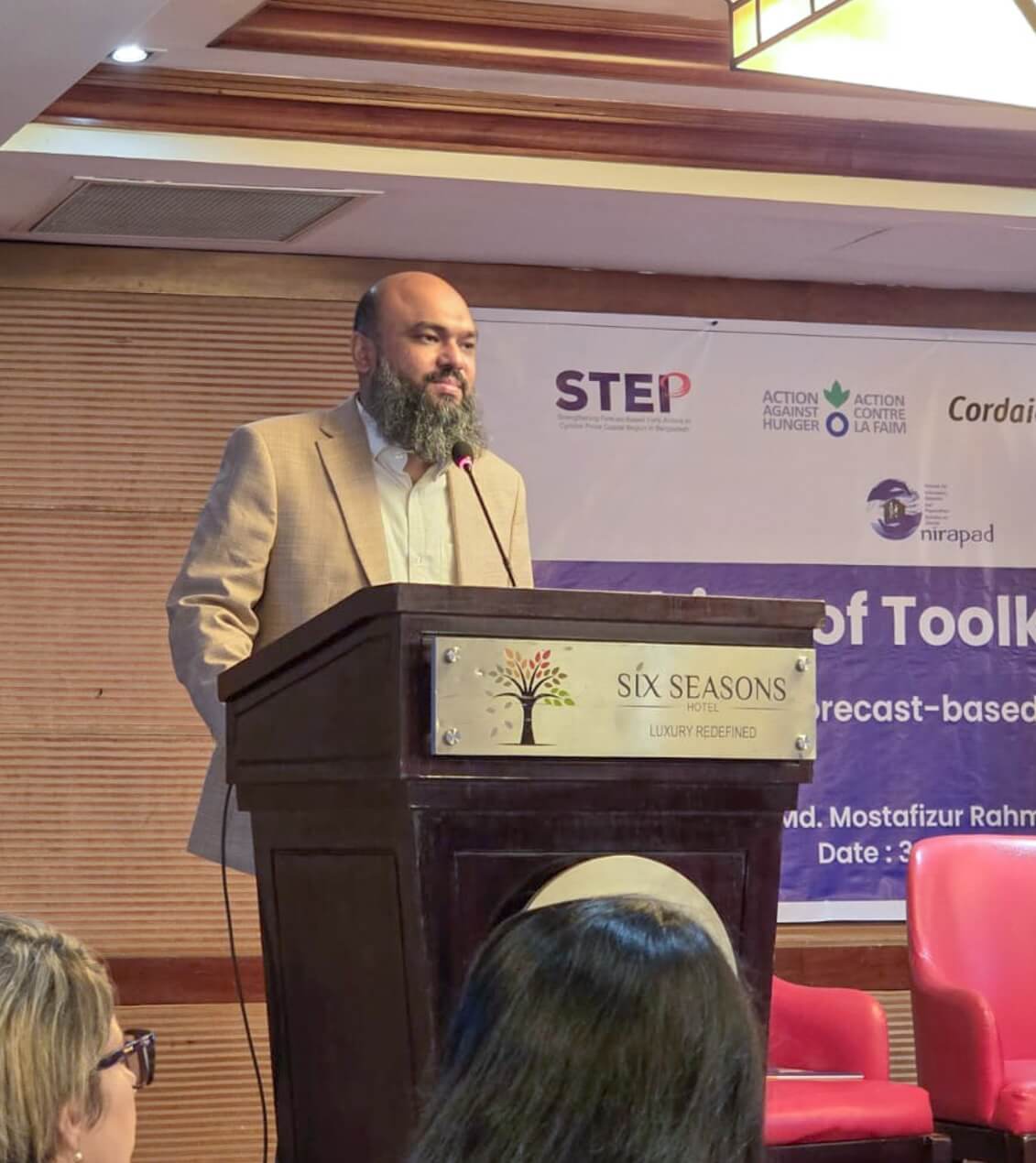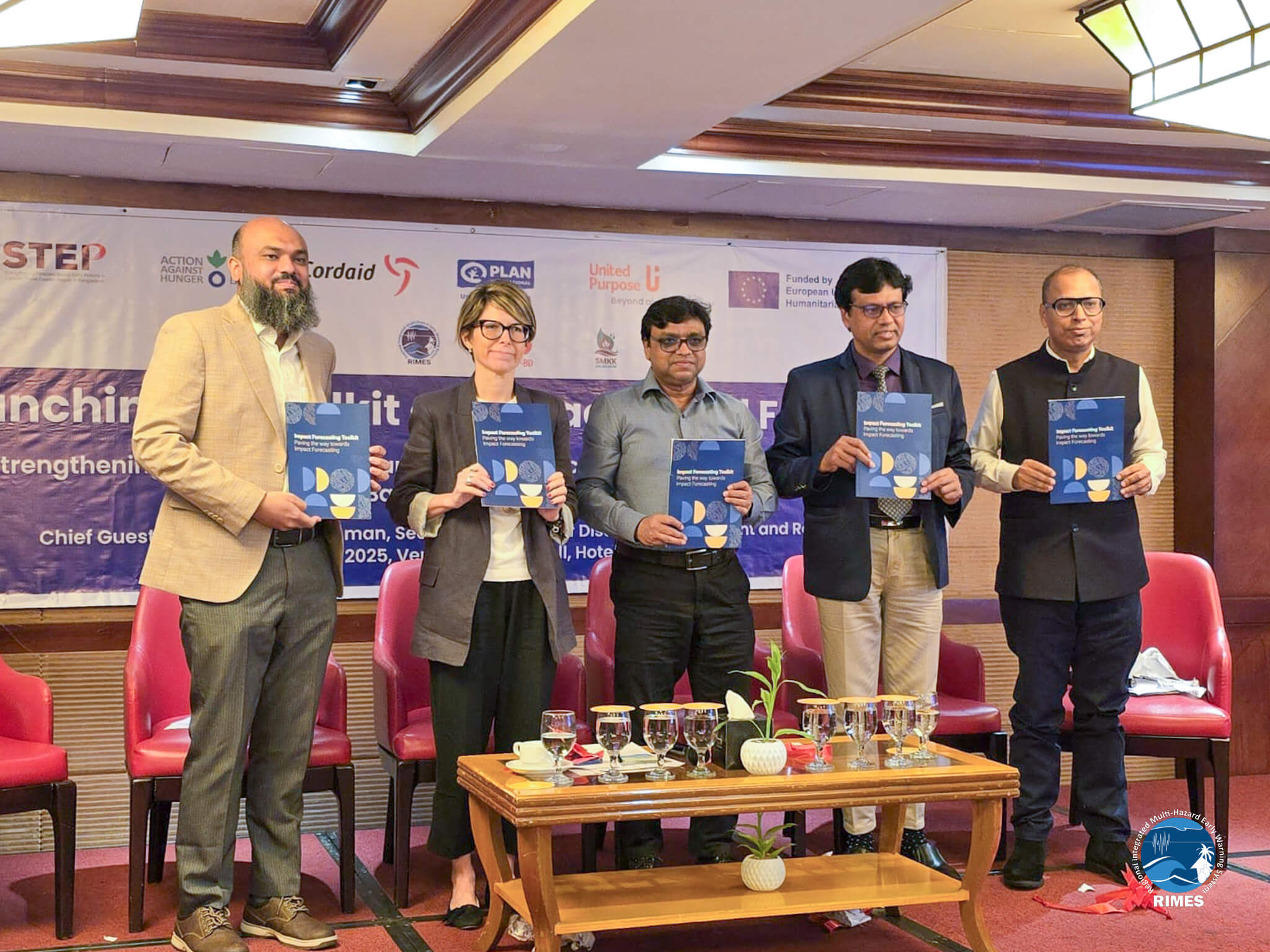Bangladesh Launches Toolkit to Revolutionize Disaster Preparedness with Impact-Based Forecasting

04 June 2025 | Dhaka, Bangladesh – A pivotal national workshop on June 3, 2025, marked a significant step forward in Bangladesh's efforts to build resilience against climate-induced disasters with the launch of an innovative Impact Forecasting Toolkit. Held at the Gressho Hall, Hotel Six Seasons, the event brought together key stakeholders to champion a shift from conventional weather prediction to understanding its direct consequences.
The workshop and toolkit launch were spearheaded by the Regional Integrated Multi-Hazard Early Warning System (RIMES), in partnership with Action Against Hunger (ACF) and the STEP Consortium. This initiative is a core component of the "Strengthening Forecast-based Early Actions in Cyclone-Prone Coastal Regions in Bangladesh (STEP)" project, which receives support from the European Civil Protection and Humanitarian Aid Operations (ECHO). The STEP project is implemented in collaboration with consortium partners Cordaid, Plan International Bangladesh, and United Purpose.
The day commenced with an insightful presentation by Raihanul Haque Khan, Country Program Lead at RIMES, titled “Towards Impact Forecasting: The Future of Forecasting.” Khan detailed the toolkit's methodology, emphasizing its capacity to connect hazard forecasts with vulnerability and exposure data. This approach aims to predict "what the weather will do," rather than just "what it will be," a crucial advancement for effective early warning and disaster preparedness. He also noted that Impact Forecasting could pave the way for Future Forecasting.
In his welcome address, Tapan Kumar Chakraborty, Deputy Country Director of Action Against Hunger, highlighted the economic benefits of proactive measures, stating, "Accurate and timely forecasts can save 16 taka in response costs for every 1 taka invested." He also affirmed the robustness and utility of the RIMES-developed toolkit.
The Impact Forecasting Toolkit was formally inaugurated by Dr. Nurun Nahar, Additional Secretary of the Planning Division, who stressed the importance of building institutional capacity to scale and promote early action nationwide.
Voices from the Panel: Grounded, Bold, and Future-Focused
A dynamic panel discussion, moderated by Mohammad Akmal Shareef, Country Director of ACF, underscored the urgent need for systemic change, institutional ownership, and a human-centered design for early warning systems.
Key insights from the panelists included:
- Dr. Anshul Agarwal , Lead South Asia Hydromet Forum Program at RIMES (joining virtually), presented international case studies from India, Sri Lanka, and Tamil Nadu, showcasing the real-world impact of Impact-Based Forecasting (IBF). He emphasized the critical journey from data to knowledge to adaptation and advocated for a globally informed yet locally relevant approach.
- Dr. Nurun Nahar , Additional Secretary, Planning Division, further emphasized the need to institutionalize IBF within national systems and development frameworks. She called for converting technical information into usable knowledge for policymakers and communities and highlighted strengthening partnerships as a key success factor.
- Md. Momenul Islam , Director of the Bangladesh Meteorological Department, called for "major investments in forecasting infrastructure, including supercomputing and artificial intelligence." He stated, “Early warning is the heart of disaster management,” and proposed a multi-sectoral platform with RIMES as a technical lead.
- Anna Orlandini , Head of Office for ECHO Bangladesh, passionately declared, “IBF is not optional—it’s essential.” She stressed the necessity of reliable data, collaborative approaches, government leadership, and a unified vision among humanitarian donors, forecasters, users, and communities.
- Ahmadul Haque, Additional Secretary and Director of the Cyclone Preparedness Programme (CPP), proposed a people-centered model of risk communication, suggesting training volunteers to localize forecasts down to the household level. He also emphasized pilot programs, capacity development, and global partnerships for long-term sustainability.
Official Launch of the Impact Forecasting Toolkit
A central highlight of the event was the formal unveiling of the Impact Forecasting Toolkit following the panel discussion. Developed by RIMES under the STEP initiative, the toolkit offers a step-by-step methodology to aid practitioners, forecasters, and disaster managers in anticipating cyclone impacts and enabling proactive measures. Panelists, including Raihanul Haque Khan (RIMES), Anna Orlandini (ECHO), Ahmadul Haque (CPP), Md. Momenul Islam (BMD), and Mohammad Akmal Shareef (ACF), held up printed copies of the toolkit, symbolizing a collective commitment to transforming Bangladesh’s early warning systems.

Achievements and the Path Forward
The workshop successfully featured a live demonstration of the toolkit, alongside presentations and open-floor dialogues, allowing participants to explore challenges and opportunities for operationalizing IBF across Bangladesh.
Key themes that emerged from the discussions included:
- Converting forecasts into tangible community action.
- Prioritizing sector-specific forecasting.
- Establishing a common platform for data sharing.
- Integrating IBF into government planning and decision-making processes.
- Creating an early action system that is people-first and informed by loss and damage.
The event is expected to lead to increased awareness of IBF's potential to revolutionize disaster preparedness, a strengthened commitment among stakeholders to institutionalize IBF, and valuable feedback for the toolkit's broader deployment.
In his closing remarks, Raihanul Haque Khan urged participants to keep communities at the center of all forecasting efforts. “Let’s develop systems that work for people—not just institutions. Let’s connect the dots and build a future where forecasting leads to protection, not just prediction,” he concluded. The workshop wrapped up with an interactive discussion session and a vote of thanks by consortium representatives.
The STEP initiative, funded by the European Union through ECHO, continues its mission to strengthen governance in disaster risk management and enhance the anticipatory capabilities of local institutions and communities in Bangladesh's cyclone-prone regions.